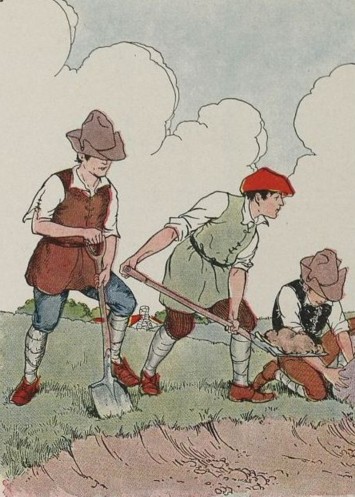PART A_1
Let’s learn vocabulary. Listen and repeat the words and the sentences with your tutor.
PART A_2
| 1. estate | /i-STEYT/ |
| -a large area of land in the country which is owned by a family or an organization and is often used for growing crops or raising animals | |
| The largest estate in the town belongs to a prominent family. | |
| 2. treasure | /TRE-zher/ |
| -very valuable things, usually in the form of a store of precious metals, precious stones or money | |
| The miners found the hidden treasure in a quarry site. | |
| 3. spare | /sper/ |
| -to give time or money to someone | |
| She had time to spare so she decided to drop her social life. | |
| 4. harvest | /HAR-vest/ |
| -when crops are cut and gathered from fields | |
| She is now harvesting the crops to be able to sell them. | |
| 5. bountiful | /BAWN-ti-ful/ |
| -(of a person) generous, or (of a thing) large in amount | |
| The real estate which the petitioner defended was bountiful land. |
PART B_1
Let’s read the story. Please read them aloud, and I will check your pronunciation and intonation.
PART B_2
The Farmer and His Sons

A rich old farmer, who felt that he had not many more days to live, called his sons to his bedside.
“My sons,” he said, “heed what I have to say to you. Do not on any account part with the estate that has belonged to our family for so many generations. Somewhere on it is hidden a rich treasure. I do not know the exact spot, but it is there, and you will surely find it. Spare no energy and leave no spot unturned in your search.”
The father died, and no sooner was he in his grave than the sons set to work digging with all their might, turning up every foot of ground with their spades, and going over the whole farm two or three times.
No hidden gold did they find; but at harvest time when they had settled their accounts and had pocketed a rich profit far greater than that of any of their neighbors, they understood that the treasure their father had told them about was the wealth of a bountiful crop and that in their industry had they found the treasure.
The industry is itself a treasure.
“My sons,” he said, “heed what I have to say to you. Do not on any account part with the estate that has belonged to our family for so many generations. Somewhere on it is hidden a rich treasure. I do not know the exact spot, but it is there, and you will surely find it. Spare no energy and leave no spot unturned in your search.”
The father died, and no sooner was he in his grave than the sons set to work digging with all their might, turning up every foot of ground with their spades, and going over the whole farm two or three times.
No hidden gold did they find; but at harvest time when they had settled their accounts and had pocketed a rich profit far greater than that of any of their neighbors, they understood that the treasure their father had told them about was the wealth of a bountiful crop and that in their industry had they found the treasure.
The industry is itself a treasure.
PART C_1
Let’s answer comprehension questions. Please answer them based on the story.
PART C_2
| 1. | What was the message of the farmer to his sons? |
| 2. | Were the sons able to find the treasure? |
| 3. | What did the sons realize about the treasure? |
PART D_1
Let’s discuss the story. Please answer the questions below and express your opinions.
PART D_2
| 1. | Do you think the farmer knows that there is no treasure in the ground? How did you say so? |
| 2. | What do you think is the objective of the farmer in giving that last statement to his sons? |
| 3. | How do you think the sons react upon finding out that there was no treasure? Do you think they are happy with the industry? |
| 4. | Do you agree with the moral of the story? Why or why not? |
| 5. | Why do you think one should always protect his/her industry? |
REVIEW AND FEEDBACK
Now, let us review the things that you learned in this lesson.
ではこのレッスンで学んだことを振り返りましょう。
(Please give a short feedback on how your student did on your class.)
| Grammar 文法 |
Pronunciation 発音 | Vocabulary 単語 |
Comprehension 理解 |
|
|---|---|---|---|---|
 GOOD GOOD |
文法の誤りはほとんどなく、完全な文章で話すことができる | ほとんどの単語をはっきりと正しく発音することができる | 習った表現を適切に使うことができる | 文章を理解し、質問に正しく答えることができる |
 FAIR |
文法の誤りはあるが、完全な文章で話すことができる | 発音の練習が必要な言葉がいくつかある | たまにミスはあるが、習った表現を適切に使うことができる | 文章を完全に理解するのは難しく、質問に正しく答えられないときもある |
 POOR |
文章で話すのは難しく、単語だけで話すことができる | 発音の練習が必要である | 習った単語と表現を少しだけ使うことができる | 文章を理解するのは難しく、質問に答えるのは難しい |
Parts of this lesson material are based on:
An eBook from The Project Gutenberg.
This eBook is for the use of anyone anywhere at no cost and with almost no restrictions whatsoever. You may copy it, give it away or re-use it under the terms of the Project Gutenberg License included with this eBook or online at www.gutenberg.org
An eBook from The Project Gutenberg.
This eBook is for the use of anyone anywhere at no cost and with almost no restrictions whatsoever. You may copy it, give it away or re-use it under the terms of the Project Gutenberg License included with this eBook or online at www.gutenberg.org